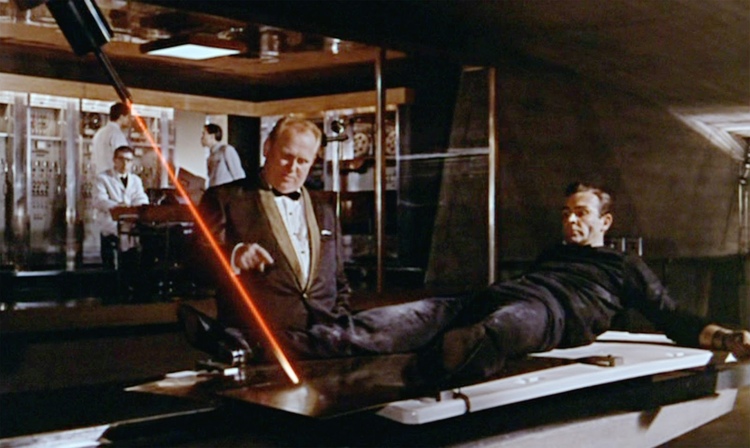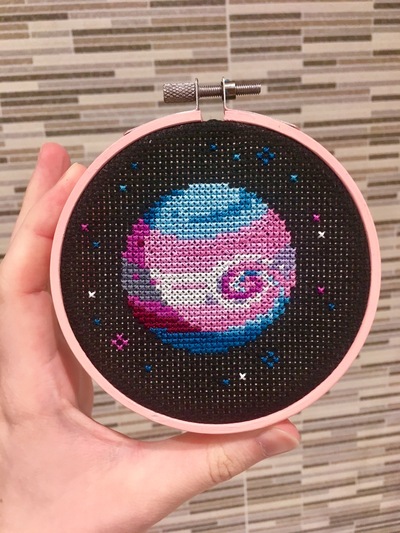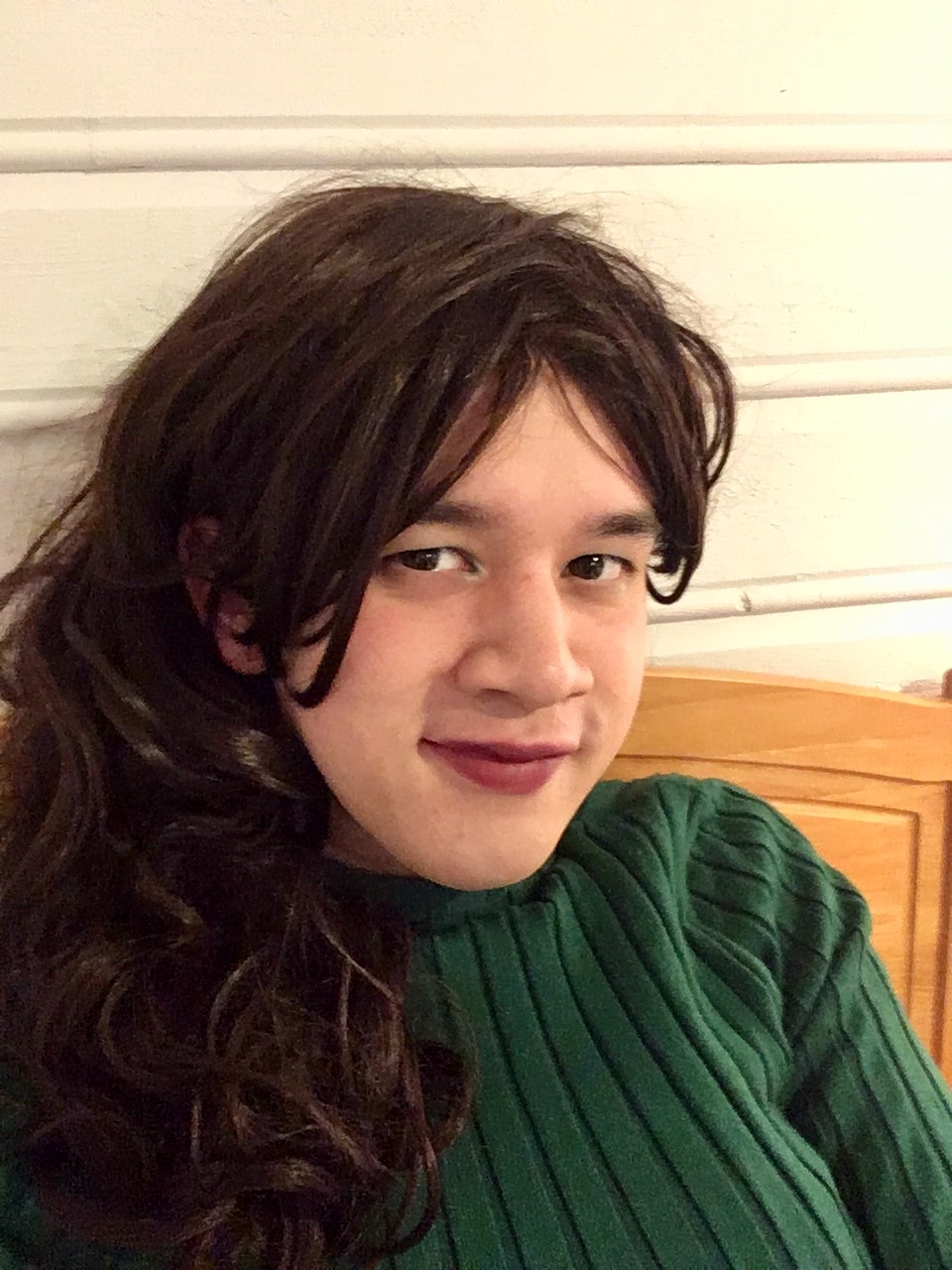An inescapable conclusion
If you listen to some of my friends, they’ll say that I’m a spy. They’ll tell you that I often talk about espionage and spycraft. I know all the spy in-jokes and terminology. I read books written by and about spies, and I hang out in Bletchley Park. I grew up in the vicinity of GCHQ and I studied maths at Cambridge, so I must know lots of other spies. And so on.
I’ve always fervently denied this. “I’m not a spy”, I’d say, to which they inevitably reply, “That’s just what a spy would say”. For a long time, I thought this was true.
But now, in 2019, it’s time for me to face the truth. I am a spy.
You might wonder how I came to this conclusion. If I was already ignoring so much evidence, what changed my mind? The answer: Goldfinger. Even if you haven’t seen the film, you’re probably familiar with one famous scene: Bond is lain on a table as Goldfinger gives a classic villain monologue, then leaves the room as the laser is about to bisect our hero.
Lying on a table as a laser is fired at you is a pretty niche activity – surely something that only happens to spies, right? And it’s happened to me four times now, so I must be a spy, right? Once I could ignore, but four seems pretty conclusive.

Except… I’m not a spy. (Or if I was, I’m not now – admitting that you’re a spy on your blog tends to curtail a career in espionage.)
So why do I keep having lasers fired at me while I’m lying on a table? Why would I be in that scenario, if not captured by a supervillain?
If you’ve heard me discussing gender, you might wonder if I’m trans. You might notice that I often talk about gender and transition. I know all the trans in-jokes and terminology. I read books written by and about trans people, and I hang out with them at conferences. I spent a lot of time on trans Twitter, so I must know lots of other trans people. And so on.
I’ve always fervently denied this. “I’m not trans”, I’d tell myself, to which the voice in my head would inevitably ask, “Then why are you such an enthusiastic cis ally?”. I tried to pretend I couldn’t hear it. For a long time, I thought I was just being a good ally.
But now, in 2019, it’s time for me to face the truth. I’m trans.
You might wonder how I came to this conclusion. If I was already ignoring so much evidence, what changed my mind?
I’d put off thinking about this for a long time, because thinking about gender seems big and scary. If you’re trans, you face a world of hostility and aggression, and it opens a box of uncertainty and big decisions. If I pretended not to be trans (to myself as much as anybody else), I wouldn’t have to go through that. I knew there might be something up with my gender, but I was trying to ignore it, and the hard questions I’d have to answer.
Last year, I unexpectedly discovered that a lot of my work colleagues are trans-friendly, and were willing to stand up to transphobia at work. More specifically, they’d stand up to transphobia aimed at me. The facade had already been slipping, and this was the final straw. Transitioning is hard, but knowing you have supportive people around you makes all the difference.
I knew that if I decided to transition, I’d never get a better opportunity – so now was the time to ask myself those tough questions.
If you start wondering about your gender beyond “the parts I was born with tell me what I am”, you end up asking “how do I know what I am?”. One answer is as simple and common as it is unhelpful:
“You just know.”
But I didn’t “just know”. I thought that maybe my assigned-at-birth gender wasn’t right for me, but I didn’t have a strong sense about what would be better – but how could I tell?
Since that’s not helpful, I’m going to talk a bit about my gender identity, and how I’ve been thinking about it this year. Reading other people’s experiences helped me explore my gender, and maybe my experience can help somebody else.
I was born a boy, and for twenty-odd years, I didn’t have any strong feelings about my gender. When I was a teenager, I had vague thoughts that it might be nice to be a girl instead, but I always kept them to myself. It felt like an aberrant thought; something to be ashamed of and to be repressed.
When I was younger, I didn’t have much exposure to trans people (except as the occasional punchline in sitcoms), and “transgender” wasn’t a word in my vocabulary. I didn’t wonder if I was trans because I didn’t know being trans was a thing you could be.
After university, I started spending a lot more time in LGBTQ+ communities, and I started meeting people who were visibly trans. I met a couple in person at PyCon UK, and through them I started meeting more trans people on Twitter – it’s a small, tight-knit community – and now I consider many of them to be good friends. I took an interest in the issues that affected them, I started learning about transition, the community in-jokes, and so on.
Alongside all this, I was becoming a lot more comfortable in my own skin. As a teenager I’d never really liked my appearance, but now I was starting to take pictures of myself I didn’t hate! I was learning to like my body, and developing a fashion sense I actually enjoyed. This is one of the early ways my trans friends rubbed off on me – there’s a strong sense of body positivity in the trans community. I wasn’t thinking of myself as trans yet, but those vibes were infectious.
Deep down, I knew I still had those unaddressed feelings about gender from since I was younger, but I pushed them down and tried to ignore them. Hanging out with trans people was bringing them closer to the surface, but I still wasn’t ready to think about them. It’s clear in hindsight, but I was in deep denial.
If you realise you’re trans, and think it looks obvious in retrospect, you’re probably right – but don’t beat yourself up about it, that’s a very common feeling.
As I spent more time with my trans friends, I kept hearing parts of their stories that resonated. I learnt more about dysphoria, and how it isn’t all or nothing – I’d become comfortable with most of my body, but facial hair in particular was still a massive source of discomfort. I started to acknowledge the things that had made me feel uncomfortable, like being lumped in with “the guys”. I realised the majority of my friends were women. I enjoyed spending time with trans friends. There was a secret part of me that wished I looked as good and happy as my trans friends. And so on.
After the incident at work last year, I finally confided my feelings in a couple of close friends. They were very patient, and very kind, and they talked through what I was thinking. They listened to me as I explained my confusion, and gently pointed to resources and other people who’ve had similar feelings. I am so grateful to them for their help.
I’ve also written a lot of journal entries about my gender, because writing is how I unpack my thoughts. I’ve spent a lot of time talking about it in therapy, and speaking aloud to my empty flat. I was anything but sure – it’s taken a lot of thinking and self-reflection to reach any conclusions.
I spent a lot of time wondering if I’m a trans woman. I’ve been experimenting with appearance – makeup and clothing and wigs. I’ve been experimenting with identifiers – using “she/her” pronouns, and trying the name “Lexie”, which is a feminine slant of my name I’ve always liked. I spent most of a recent conference in girlmode, and I’ve spent days where I think of myself as a woman.
And I’ve been having lasers fired at me while lying on a table to burn off my wretched facial hair. (Although I’m paying for the treatment with a credit card, not gold.)
There are aspects of femininity I like, and I’ve been much more femme in the last six months, but “trans woman” doesn’t feel quite right to me. I’ve had feminine days, and those feel good, but that identity doesn’t fit. At least for now, I don’t want to make a complete 180° change.
And in hindsight, that makes sense: some of my feelings resonate with the trans women I know, but others are quite different. I don’t have much dysphoria about my maleness, or any real desire to deconstruct my male identity (at least, not right now). A lot of the trans women talk about their old male identity with disgust, and hate the body they were born with. They shed that identity years ago, and they aren’t looking back. I don’t get that feeling at all.
There are masculine behaviours and feelings I quite like, actually. I’ve added some more feminine stuff to the mix recently, but I don’t want to pick one or the other. I quite like being able to pick from one or the other, depending on how I feel on a given day.
So if I’m not a cis man and I’m not a trans woman, what am I?
At this point, a lot of you are probably mouthing the words “non-binary”. That’s sort of where I am right now, except I hate that particular term for describing myself. (I don’t mind other people using it, and I’ll repeat their choice to use it for themselves, but it feels viscerally wrong to me.) It’s defining myself in terms of a negative – the “none of the above” option, and that doesn’t feel very satisfying. I’d rather have a positive, affirmative way to describe my gender – but I’m still working out what that is.
I spent a lot of time ignoring any sort of non-binary identities precisely because I had a hangup about the specific term “non-binary”. There’s a huge variety under that umbrella, and I want to spend more time exploring those, but it took me a while to even consider it. That’s what I’m thinking about right now, and it feels better than “trans woman” ever did.
Right now, I’m experimenting with the labels genderfluid and genderqueer, and maybe one of those will stick – but that’s a question I’m still considering.

So far, this has been a pretty positive change.
I came out to my close family a few months ago, and they’ve been very kind about it. I know it wasn’t the easiest news for them to hear, but they’ve all been supportive and let me make my own decisions. (One of the hardest things to explain was why I’d been so nervous about telling them – most trans people aren’t anywhere near this fortunate.)
My work colleagues have been pretty nice (as expected), as have the friends I’ve told so far.
It’s not easy. I’ve been thinking about my gender almost continuously for most of this year, and it gets exhausting. Rethinking a major part of my identity, and reevaluating years of thoughts and experiences – that takes a lot of energy. I keep remembering thoughts or feelings from years back, and the penny drops. “Oh, that’s why I thought/felt/said that!” (I can’t imagine how much harder it is if you realise you’re queer/trans when you’re older, and have even more life that suddenly gets recast in a new light.)
I have more to think about, but thinking about it all the time is exhausting, and I need to slow down for a bit. This is a good milestone. I know that I’m trans, and I’m comfortable saying that, and that’s enough for now. I don’t have to solve it all at once.
Practically speaking, I’m a lot happier! Getting to experiment with my gender identity and expression is fun, it makes me happy, and there’s more variety and colour in my life. Those are all good things.
I’m not changing my name – I have warm fuzzy feelings about “Alex”, and it’s a nice gender-neutral name too. But I’ve enjoyed experimenting with “Lexie” in private, so expect to see that occasionally.
I haven’t found a set of pronouns I like, and I’m still experimenting – so if I haven’t said otherwise, please use “they/them” for me?
I can’t pretend it’s all sunshine and roses – I’ve already had some pretty nasty comments online, and more than one unpleasant encounter when I’m on public transport with a feminine appearance – but I’ve been lucky so far. There are risks involved, and I’m giving up a bit of safety to do this, but it makes me so much happier that it feels worth the risk.
I know this is a long post, but the context is important. It took a lot of experimenting, learning and listening to get to where I am. There’s more to do, but I’m pleased with how far I’ve already come.
So why am I writing about this? I could retreat, be quiet about it, and keep these thoughts private. But I want to be public about it.
When I was trying to work out if I was trans, it was really helpful to see and read experiences of other trans people who were willing to be visible. I’m so grateful for that, especially because I know it’s something that wasn’t available to many of them – even just five or ten years ago, trans people were much less visible than they are today.
I can afford to be visible and share my story, so here I am. If I can make it easier the next trans person who comes along, that’s worthwhile. I want to pay it forward.
And I want to talk about it! This is something that makes me happy, and it’s giving me a lot to think about, and I want to share that. I don’t want to hide it or pretend it’s not happening. Being trans isn’t something to be ashamed of.
If you’re reading this and you’re wondering if you’re trans, here’s some distilled advice:
-
Listen to other people. There are lots of trans people writing about their experiences. Read up, learn about what other people have experienced and what they felt, and see what resonates with you.
-
Learn to self-reflect. Most people suck at self-reflection (including me). Take some time to dwell on your own thoughts. Only you get to decide what your gender looks like – so you need to be able to unpick your feelings. For me, that comes from journalling, therapy, and talking to friends/family.
-
Have fun! Experiment. See how different things feel – clothing, identifiers, names, behaviours. Trying something once doesn’t mean you’re committing forever, but every time you do you’ll get to find out how it makes you feel.
-
You don’t have to answer everything all at once. Don’t feel you have to be sure of what your gender identity is before doing stuff that makes you happy. If you are sure, great! But if not, you can try it one step at a time.
As somebody wise once told me: “explore the territory, not the map”. You don’t need to know who you are before you make a change.
-
Don’t go alone. There’s a whole community of trans people out there who love you and want you to be happy. Whether that’s online or in person, we can support you if you aren’t getting it elsewhere. My emails and Twitter DMs are always open.
So hi, I’m Lexie, I’m trans, and I feel fabulous. Thanks for reading to the end!
